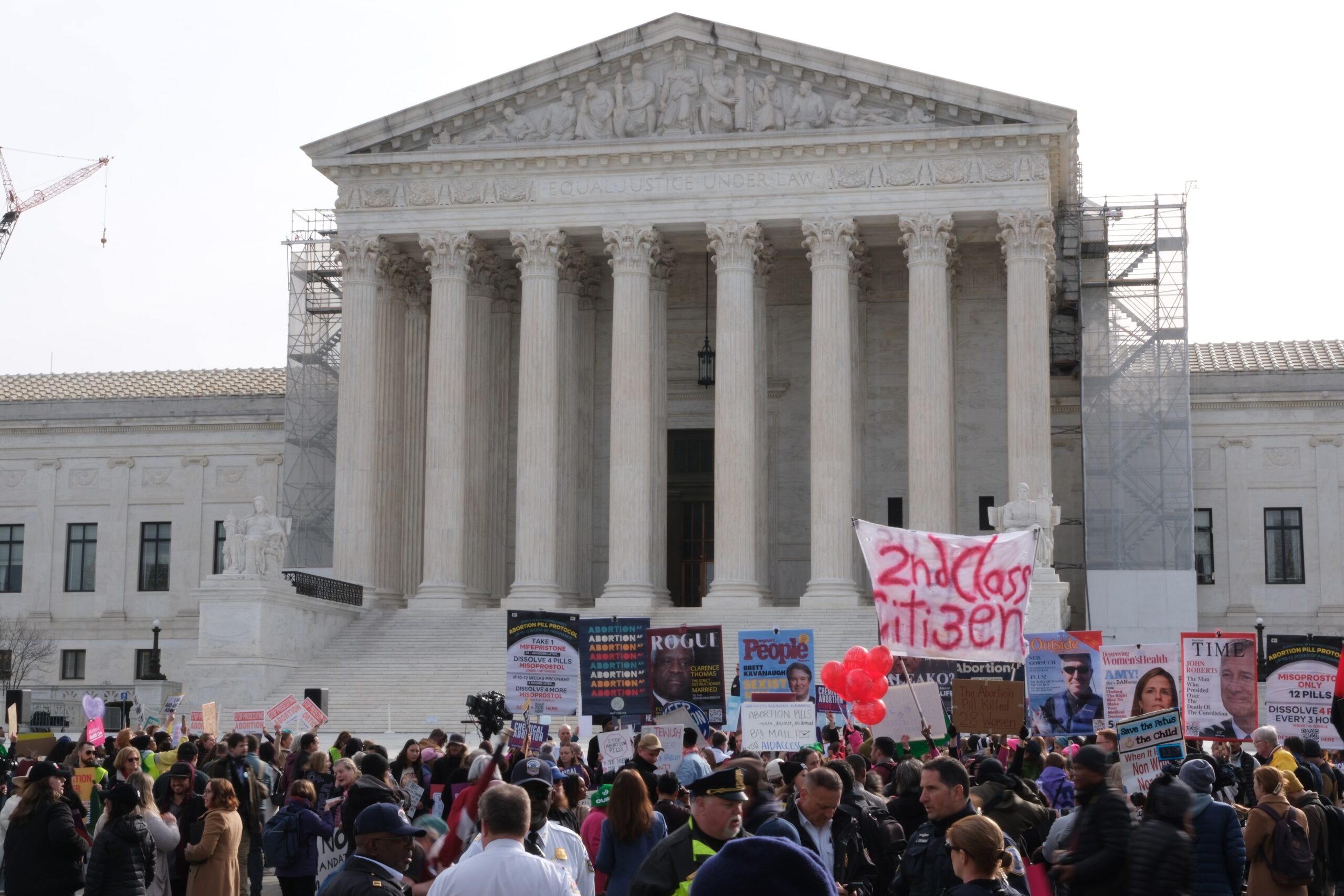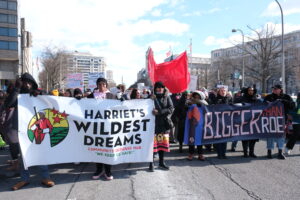Thousands of protesters protested at the Supreme Court against potential restrictions on the use of a common abortion medication, mifepristone, as oral arguments began for FDA v. Alliance for Hippocratic Medicine on March 26, the Supreme Court’s first abortion case since the overturn of Roe v. Wade in 2022. Tensions flared, with police arresting several protesters after they allegedly ignored the instructions of police.
The case made its way to the Supreme Court after the Alliance for Hippocratic Medicine, a group of anti-abortion physicians and organizations, sued the FDA in October 2022. The Alliance claims that the FDA broke the law by approving Mifepristone in 2000 and expanding its use in the following years despite alleged health and safety issues associated with the drug, citing studies that show higher risk of hemorrhages and infections after medication abortion.
Pro-choice advocates, however, cast doubt on these studies and point to other research that finds that mifepristone carries a low risk of side effects.
“Mifepristone is safe and effective. It’s been proven for more than two decades,” Olivia Capello, assistant associate director for state advocacy and communications with Planned Parenthood, said in an interview with the Voice. “While we don’t know for sure what the Supreme Court will say in June, we do expect that it could severely limit access to medication abortion.”
At least 63% of all abortions that took place in the United States in 2023 were medication abortions—a 10% increase after the SCOTUS overturned Roe v. Wade. Medication abortions are completed using one dose of mifepristone and one dose of misoprostol. Both medications work in tandem to ensure safe and effective abortions and have been supported by medical professionals and the scientific community. Mifepristone has been available in the U.S. since 2000, and individuals can access mifepristone through a healthcare clinic or via telemedicine.
An August 2023 ruling by the Fifth Circuit Court of Appeals declared the FDA should restrict access to mifepristone, changing how healthcare professionals are able to prescribe mifepristone. Mifepristone would only be available via in-person appointments with an official prescriber, eliminating remote telemedicine options for those who do not have access to such services.
If the Supreme Court rules in favor of the Alliance for Hippocratic Medicine, mifepristone would only be accessible until the seven-week stage of pregnancy, instead of the original cut-off of 10 weeks. Such a move would substantially reduce the number of people who could receive the medication — one in three people find out they’re pregnant after the sixth week of pregnancy.
The rally, organized by the American Civil Liberties Union (ACLU) and several other pro-choice groups, began at 9 a.m., roughly an hour before oral arguments began inside the court. Protesters chanted, sang, and played music before organizers began speeches.
Amber Hikes, deputy executive director of strategy and culture at the ACLU, spoke first.
“We are here because a small group of extremists are trying to bypass our democracy and push their narrow anti-abortion agenda,” Hikes said. “We represent the people. We represent the right to decide what to do with our bodies.”
Hikes then handed the microphone to representatives from the Amarillo Reproductive Freedom Alliance (ARFA). ARFA was formed in Nov. 2023 after FDA v. Alliance for Hippocratic Medicine was originally heard in Amarillo, Texas.
Lindsay London, an organizer with ARFA, encouraged demonstrators to advocate for those in states like Texas, where lawmakers continue to place restrictions on access to abortion and contraception.
“We know what it’s like to have to drive a loved one hundreds of miles to get an abortion, facing constant risk to have control over our own lives,” London said. “We know the critical importance of medication abortion access for the millions of Americans whose clinics have been closed down. ”
Christian Nunes, the president of the National Organization for Women, emphasized that abortion plays a crucial role in women’s healthcare.
“We know with health disparities that they are only exacerbated by the multiple intersecting identities in our communities. Mifepristone has been a resource to narrow the gap in healthcare deserts. It creates access to care and saves lives from maternal mortality, especially for Black women, who we know in this country are still 3x more likely to die from pregnancy-related causes than white women.”
Other speakers included representatives from the D.C. Labor Chorus, who led demonstrators in several different protest songs. After speeches finished, organizers unfurled a yellow banner displaying names of the nearly half a million people who signed a petition titled “We the People Support Medication Abortion.” The banner nearly spanned a city block.
Demonstrators then began to walk to First Street and Constitution Avenue NE, with heavy police presence surrounding them. After protesters entered the area near the U.S. Capitol, police arrested several demonstrators after they allegedly ignored warnings to move. Four representatives from the Women’s March were among those arrested, including executive director Rachel O’Leary Carmona.
“This morning, we put our bodies on the line to shine a light on how this totally illegitimate court case could strip millions of women of their rights to make decisions about what is best for their bodies and their families – and we were arrested,” Carmona wrote in an email to the Voice. “The reality is that this case is personal, and we took it as such.”
The U.S. Capitol police maintain that those arrested violated warnings given by officers.
“A group of about 13 people were moving around Capitol Grounds—illegally blocking roads and then a walkway. Our officers warned the group to stop blocking the walkway or they would be arrested. They refused, so our officers arrested them,” a spokesperson for the U.S. Capitol Police wrote in an email to the Voice.
Several Georgetown students attended the rally. Caitlyn (CAS ’24), who wished to be identified only by her first name, emphasized that students have a duty to stand up for reproductive rights.
“We have such immense privilege being at the institution that we are,” she said. “I think the saying ‘we’re the future’ is really cliche, but there’s so many people who are interning on the Hill and becoming part of these really important areas of the government. And so, we’re going to stand up for what’s right and for people’s human rights.”
Historically, Georgetown, as a Catholic and Jesuit institution, has refused to recognize abortion rights and contraceptive access for students. The university annually hosts the Cardinal O’Connor Conference On Life, the largest pro-life gathering for students in the country.
Jamie L. Manson is the president of Catholics for Choice, a national organization of Catholics that advocates for reproductive rights. Manson told the Voice that the values of the Catholic Church and Jesuit ideals align with many pro-choice principles.
“The Jesuits really pride themselves on being these prophets of social justice,” Manson said. “Yet abortion bans and restrictions cause disproportionate suffering and harm to the people they claim to want to center, which is the poor and the vulnerable and the marginalized, and they just haven’t reckoned with that.”
Just after the rally, reports from inside the court indicated that justices seemed unlikely to rule against the FDA and restrict mifepristone. However, the court’s official opinion won’t be released until June.
Beyond June, organizers cited the 2024 election as a critical juncture for reproductive rights across America.
“With the election coming up, we’re gonna need so much help,” Capello said. “Knock on doors, make phone calls and host house parties and get people fired up for the election, and to help turn out people in our communities to vote in November.”
Pro-choice advocates plan to continue to fight for reproductive justice, until November and beyond.
“So I ask you today [to] keep showing up,” Nunes said at the rally. “Keep telling your families why it is so important to be able to access mifepristone. This is a fight for all of us and we cannot give up.”





